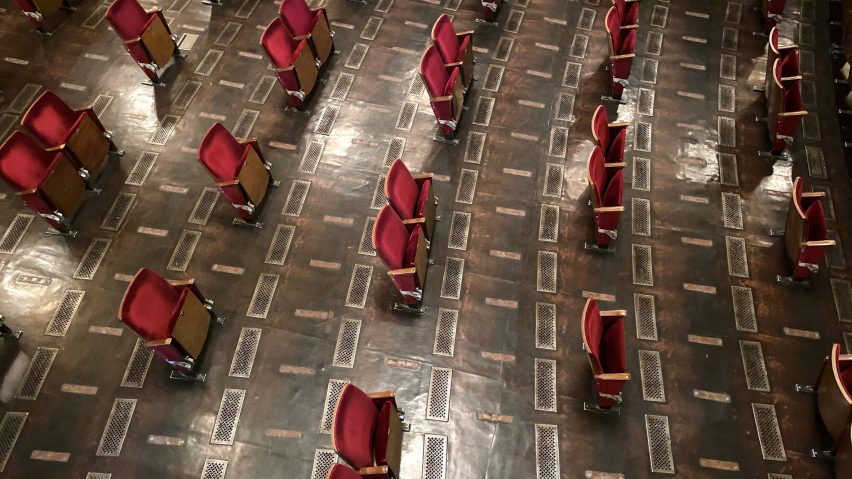
Berliner Ensemble gives glimpse of its socially distanced theatre
The Berliner Ensemble theatre group has removed around 500 of its 700 seats to prepare for reopening in alignment with Germany's social-distancing policies.
The Berlin-based theatre group, which operates from the 19th century Theater am Schiffbauerdamm building, shared an image of its auditorium on Twitter to give theatre-goers an idea of the experience they will have when it reopens following the Covid-19 pandemic.
Around 70 per cent of the auditorium's seats have been removed, with every second row cleared and seats arranged either individually or in pairs on the remaining rows.
Berliner Ensemble removed the seats as part of its investigation into how social distancing can be achieved when the theatre reopens in September. The removed seats will be renovated while they are not needed.
"This allows us to follow the rules of physical distancing"
"The seats were removed in the last 10 days for two reasons: On the one hand, we try to come up with creative solutions for the current corona regulations," said Oliver Reese, artistic director of Berliner Ensemble.
"The auditorium now looks like an installation, it is not just empty rows," he told Dezeen. "By removing the seats, the remaining ones are easier to access."
"This allows us to follow the rules of social, or the way we like to put it, the rules of physical distancing. On the other hand, we will use the removal for a renovation of the historic seats."
Along with the reduced number of seats, when the theatre reopens the Berliner Ensemble will instigate a range of measures to ensure that the official regulations, which stipulate a minimum distance of 1.5 meters, will be maintained.
"Tickets will be checked contactless, spectators must wear a mask until they reach their seat and there will be a crowd management system during the entry," said Reese.
"The order of admission will be strictly regulated. The guests will be brought to their seats in small units – approximately six people – so that there are no traffic jams and the distances between the individual visitors, couples, or groups can be observed."
This is an "extraordinary seating plan"
Although the majority of seats have been removed from the theatre, the Berliner Ensemble wants to make the experience of a performance as enjoyable as possible for its socially distancing audience.
"We really want to play! It is not only our primary mission and obligation as a public theatre but also our heartfelt wish to get back on stage," explained Reese.
"We had to change the plans for our next season several times in the past weeks, but I am happy that we have finally discovered creative and playful ways with our actors and artistic teams to deal with the regulations in the coming season with an indeed extraordinary seating plan," he continued.
"We should definitely keep in mind that the seats are removed temporarily. We are all longing for normality. But I am absolutely sure that our ensemble will perform with at least the same energy for 200 than for 700 people."
Along with theatres, architects and designers have been creating solutions to allow people to socially distance in office, hotels and restaurants. US architecture firm MASS Design Group has outlined strategies to allow restaurants to open following coronavirus, while UK architecture studio The Manser Practice has explained how hotels would need to be adapted.
Also in the UK, Weston Williamson + Partners has outlined its plans for a social-distancing workplace.